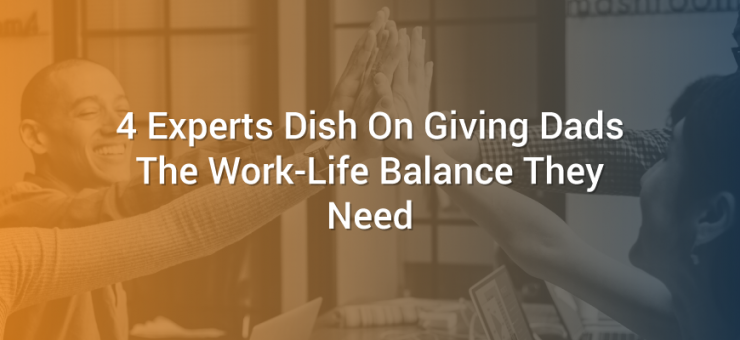Drinks manufacturing giant Diageo is giving “parental leave” the attention all working parents deserve. The employer of more than 4,500 people across the UK now allows parents to take 52 weeks of parental leave, regardless of gender or sexual orientation.
This new development highlights an issue many working fathers face in the workplace. Many don’t have the same benefits when it comes to work-life balance that their female colleagues may receive. This oversight causes issues with both workplace satisfaction and engagement.
To help you give working fathers their due, we reached out to the experts and their responses hit the nail on the head.
Here are four expert tips you need to follow to improve work-life balance for working fathers:
1. Start changing your mindset and culture
 It comes down to mindset and company culture. We need to start seeing fathers as working fathers, instead of men who happen to have children. Many companies have a long way to go in supporting all working parents. Accepting and understanding that your employees have very important responsibilities outside of work is vital to start progressing.
It comes down to mindset and company culture. We need to start seeing fathers as working fathers, instead of men who happen to have children. Many companies have a long way to go in supporting all working parents. Accepting and understanding that your employees have very important responsibilities outside of work is vital to start progressing.
Creating a culture that supports fathers in taking time when their child is sick or coming to work late to volunteer at their child’s school goes a long way in improving work-life balance. Supporting your employee’s family life is a part of your company’s compensation package and will definitely create loyalty and longevity.
Sharon Rosen, Chief People Officer at HeraldPR
2. Create flexible schedules for all employees
 Our flexible schedule makes work-life balance ideal for fathers. We don’t have set times employees need to be in the office. Some of our employees show up as early as 6 a.m. and others as late as 10 a.m. This allows fathers to essentially choose whether they want to spend more time with their kids in the morning or in the evening.
Our flexible schedule makes work-life balance ideal for fathers. We don’t have set times employees need to be in the office. Some of our employees show up as early as 6 a.m. and others as late as 10 a.m. This allows fathers to essentially choose whether they want to spend more time with their kids in the morning or in the evening.
For example, one of the fathers in our office chooses to arrive later because his wife works early shifts. By coming to work around 10 a.m., he’s able to spend time with his kids in the morning. He gets them ready for school, makes breakfast, and drops them off at school.
We have another father in the office who likes to take off early. He usually arrives around 6:30 a.m. so he can pick up his kids from school and help them with homework. This even gives him time to coach their little league team.
With set-in-stone work schedules, neither of these fathers would have this luxury.
Matthew Ross, Co-Owner and COO, The Slumber Yard
3. Train managers on time off accommodations
 Fathers caring for their children have the same issues that any parent has — they have to put their kid’s health and well-being first. Employers need to train their managers to understand any working parent, male or female, may need time off at a moment’s notice. Failure to provide that kind of accommodation puts employees in a tough spot.
Fathers caring for their children have the same issues that any parent has — they have to put their kid’s health and well-being first. Employers need to train their managers to understand any working parent, male or female, may need time off at a moment’s notice. Failure to provide that kind of accommodation puts employees in a tough spot.
If a male single parent, for instance, gets a call that their child is sick or hurt at school, they’re not going to tolerate being disciplined for leaving the job early. If the employer makes an issue of it, the worker is likely to leave the workplace to find family-friendly employment.
It’s important to note, company review sites significantly improved how job seekers search for company cultures and new roles. Both Indeed and Glassdoor provide a transparent look into flexible work policies. Companies failing to adapt to the realities of working parents may find fewer qualified workers applying.
Laura Handrick, Career and Workplace Analyst at FitSmallBusiness.com
4. Highlight parental benefits
 When a family is ready to welcome a new life, people’s attention often moves completely to the mother — at home and in the office too. Working mothers find out what benefits are available to them, advice comes in from colleagues, seniors, and others.
When a family is ready to welcome a new life, people’s attention often moves completely to the mother — at home and in the office too. Working mothers find out what benefits are available to them, advice comes in from colleagues, seniors, and others.
This situation isn’t as present for new fathers. They’re likely unsure which HR policies and benefits are available to the new-born child, the baby’s mother, as well as themselves with respect to life and health insurance, paternity leaves, and other allowances from the organization.
A training and reference deck that introduces new fathers to how HR policies impact them post-birth would be beneficial, engage them in a meaningful way, and help them better understand what fatherhood looks like from a professional standpoint.
Gargi Rajan, Head of HR at Mercer | Mettl
—
What are you doing to improve work-life balance for the dads in your office?












